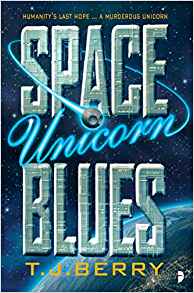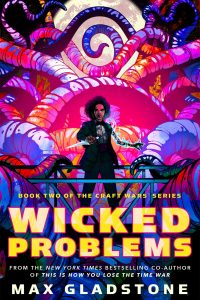Liz Bourke Reviews Space Unicorn Blues by T.J. Berry
 Space Unicorn Blues, T.J. Berry (Angry Robot 978-0857667816 $12.99), 384pp, tp) July 2018. Cover by Lee Gibbons.
Space Unicorn Blues, T.J. Berry (Angry Robot 978-0857667816 $12.99), 384pp, tp) July 2018. Cover by Lee Gibbons.
I finished reading T.J. Berry’s debut novel, Space Unicorn Blues, and said to myself (and several other people): “Maybe Angry Robot Books is becoming the publisher of queer, feminist, sometimes-angry, sometimes-funny, anti-imperialist novels that we didn’t know we deserved.” Because Berry’s Space Unicorn Blues can join a list that includes (in the UK, at least) Kameron Hurley’s The Stars Are Legion, Tim Pratt’s The Wrong Stars, Foz Meadows’s An Accident of Stars and A Tyranny of Queens, and Jeannette Ng’s Under the Pendulum Sun, and it stands up very well in this company.
Earth is a hellhole, destroyed by climate change. Humanity’s spread to the stars, where they encountered the intergalactic alliance of the Bala, a collection of various different beings who resemble creatures from Earth’s mythology. The Bala mix science and magic, and naturally humanity went to war with them for their resources – including the Bala’s bodies. Humans won. The Bala have been exploited and enslaved and murdered for parts by the authoritarian Reason government for decades, but now the Century Summit is approaching, where godlike aliens will return and judge how well humans have kept their part of the peace treaty.
Gary Cobalt has been hiding who he is for years. If the Reason knew he was part unicorn, he’d have a very shitty time: unicorn horn powers FTL flight, and the Reason have murdered or enslaved all the other unicorns. He’s just managed to survive a ten-year prison sentence for murder, and he’s trying to get his ship back. When he’s outed as a unicorn in the middle of a bar fight, his only way out – and his only way to reclaim his ship – is to ally with Jenny Perata, Maori ex-Reason military pilot, wheelchair user, and the woman who kept him chained up in a room and tortured him for his horn for years. Worse, the crime Gary was imprisoned for was the murder of Jenny’s best friend and the wife of her co-pilot, “Cowboy” Jim (an angry, aggressively mediocre straight white man, whose selfishness and personal black hole of empathy become apparent over the course of the novel).
Jenny’s taken on a contract to deliver a mysterious cargo to the location of the Century Summit. The only way she’ll get there in time – or at all – is with Gary’s ship, because she doesn’t have access to an FTL craft on her own. And she’s desperate to get there, because her wife is Bala – a dryad – who was arrested over a year ago and sent to one of the concentration camps on the planet. Jenny doesn’t know if she’s alive or dead, and she urgently wants to find out, and to rescue her.
This small misfit band is joined by businesswoman Ricky – the Reason authorities aggressively disapprove of her gender expression, and she needs to get out of town fast – and Gary and Jenny come to a reluctant agreement. But they’re all, with the exception of Jim, either pursued by the law or the kind of people whom the Reason authorities don’t hesitate to shake down or lock up, and the path to their destination includes more than one government checkpoint.
It feels like a pointed commentary on the modern age that Jim demands to have his feelings catered to at the expense of other people’s personhood. When he doesn’t receive the outsize respect to which he believes he’s entitled, he becomes a petty, selfish, petulant villain, more than willing to sacrifice Jenny to feed his ego and gain the rewards he believes he deserves (and to tell Jenny it’s her fault for not treating him better).
Jenny herself is complicated. Despite her past crimes against Gary, to Gary it seems that the years have changed her: they go from mutually distrusting, combative wariness to respect, a working partnership, and eventual friendship – brought together by the things that they have in common, rather than their differences. Jenny is also a woman who acts first and makes up her plans as she goes along: a Jenny Perata sort of rescue is the kind where things get worse before they get better.
As for Gary, he’s a very appealing guy. Despite everything that’s happened to him, he’s managed not to become brooding and hardened: he’s not friendly and trusting, but he’s still looking for the positives in life.
Berry’s worldbuilding is gloriously batshit, with a serious undertone when it comes to the realities of authoritarian governments, spacecraft that are living ecosystems kept going by dwarves – family teams of them – and necromancers, unicorns and gods, and a vicious authoritarian system that’s frighteningly realistic (right down to the occasional decent-person-just-doing-their-job who can sometimes be convinced to not do their job, just for a little while).
Space Unicorn Blues is a fast-paced romp, a story that would be gloriously pulpish if it didn’t stay so aware of the dark side (the human side) of its worldbuilding. It’s well-characterised, and possessed of clean, entertaining prose – though there are a couple of points where point of view could have been clearer, and the transitions between point-of-view characters more clearly marked. I enjoyed it deeply, and one of the reasons for my enjoyment is that it’s downright unapologetic about being inclusive, and while it pokes fun, it doesn’t pull punches.
If science fiction with fantasy elements is your jam, then Space Unicorn Blues is a very good novel for you.
Liz Bourke is a cranky queer person who reads books. She holds a Ph.D in Classics from Trinity College, Dublin. Her first book, Sleeping With Monsters, a collection of reviews and criticism, is out now from Aqueduct Press. Find her at her blog, her Patreon, or Twitter. She supports the work of the Irish Refugee Council and the Abortion Rights Campaign.
This review and more like it in the September 2018 issue of Locus.
 While you are here, please take a moment to support Locus with a one-time or recurring donation. We rely on reader donations to keep the magazine and site going, and would like to keep the site paywall free, but WE NEED YOUR FINANCIAL SUPPORT to continue quality coverage of the science fiction and fantasy field.
While you are here, please take a moment to support Locus with a one-time or recurring donation. We rely on reader donations to keep the magazine and site going, and would like to keep the site paywall free, but WE NEED YOUR FINANCIAL SUPPORT to continue quality coverage of the science fiction and fantasy field.








” … a story that would be gloriously pulpish if it didn’t stay so aware of the dark side (the human side) of its worldbuilding.”
I’m trying to parse this statement. It doesn’t make any sense to anyone who’s read the pulps of the 1920s, ’30s, and ’40s.
Currently partway through the book; little bit of a chore so far. I’m slightly acquainted with the author, so will finish it, hoping the central premise of the backstory will firm up as one goes along. (So far it’s unclear whether alien species resemble European folklore creatures because of previous visits to Earth, or what.)